Questions & Answers with community faces
Both Emmily Rosa Sheffield (29) and Jason Sheffield (29) grew up in Honor and graduated from Benzie Central High School in 2010 and 2009, respectively. Her family, the Rosas, have been in Benzie County for many generations, and her great-grandparents owned Bud’s, an Honor gas station that offered auto repair, vehicle towing, and canoe rentals up until about a decade ago. Jason also grew up in a family of entrepreneurs—he remembers spending a lot of time as a child and young adult at his grandparents’ party store, Lone Pine, located just outside Honor, near the Platte lakes.
The couple first became close friends on the school bus, back when she was a freshman and he was a sophomore. They started dating five years later, in 2011, after both moved back to Benzie County around the same time, following a couple of years away.
Having enjoyed biology in high school, Emmily attended Western Michigan University briefly, only to discover that college was not the life path for her. She then worked a rash of short-lived jobs upon landing back in Benzie County with no real idea of what she “wanted to do” professionally: office assistant at Labadie’s Summer Place Casuals, where she learned a lot about managing a small business; a server at the Crystal Cafe and in the kitchens of both The Fusion and The Manitou, all of which gave her extensive knowledge about food.
Meanwhile, thanks in large part to Jason’s high school background—he had especially enjoyed hands-on classes like building trades, wood shop, and ag-mechanics—he quickly became a highly skilled carpenter, building and repairing homes for nine years.
But in 2014, everything would begin to change. Emmily was pregnant with their first child, and the couple had decided to drive to Frankfort to fill out applications for an apartment, since they were soon to be in need of more space. While driving along M-115, they saw someone putting up a “for rent” sign in front of an old farmhouse in Crystal Lake Township, just about a half-mile from the Frankfort Gateway. Though it was above their budget and “a big-time long shot,” Jason says that they pulled into the driveway to check it out—a few weeks later, the couple made the move from Honor to the farmhouse on three acres at 1801 Frankfort Highway, which is how their future farm got its name. Later that year, the Sheffield’s daughter, Fae, was born, and their son, Jason, came two years later.
By 2017, both Emmily and Jason had quit their other jobs and were farming full time, utilizing all of the skills and passions that had brought these young entrepreneurs to this point: biology, business management, food, and building.
Continuing with our interview series on impactful Benzie County characters, The Betsie Current caught up with the Sheffields before evening chores, only a few days after two mama pigs had given birth to a total of 25 new piglets.
The Betsie Current: We want to start with the basics—what does your farm produce? What made you want to become farmers? What do you enjoy about this line of work?
Emmily Sheffield: We produce packaged pork from hogs that are raised on a diversified pasture, pigs for roasting, stock pigs for other farms, eggs from free range hens—also raised on pasture—and ecologically sourced firewood. In the past, we have had a vegetable CSA [community-supported agriculture], but we are taking a break from that in 2021, so that we can focus more effort toward the pig herd and the live pasture where we raise them. I became a farmer to fill a need in our local community for high-quality, nutrient-dense food. And also, it made sense at the time to create a job for myself, given the lacking available job market in Benzie County.
Jason Sheffield: At 23, I was a new dad-to-be and a very burnt-out carpenter. I decided that, instead of building new/second homes for folks that didn’t need them, I’d rather be producing food for people close to me—and teaching my children to do the same. The transition took a couple years.
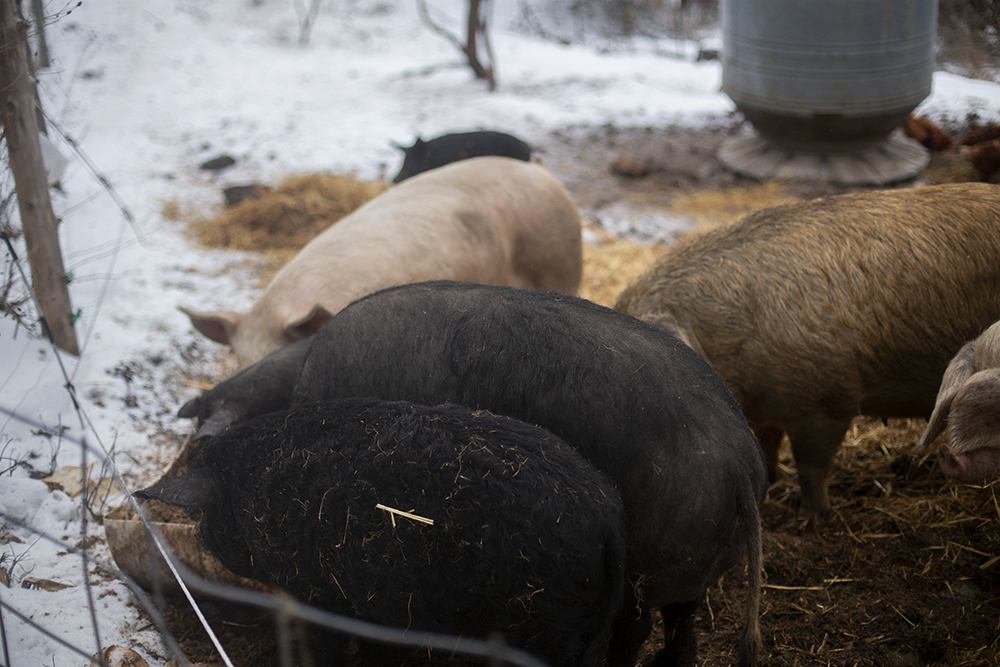
Current: Can you describe how your pigs are different from others that our readers might be more familiar with?
Emmily: We raise several rare breeds of hogs. Mangalitsa is the first rare breed that we chose to start raising, back in 2015. We bought a pure Mangalitsa and two hogs that were crossbred between Mangalitsa and other “heritage breed” genetics. Mangalitsa is a breed of pig that originated in Hungary. Some investors in southern Michigan imported the breed to the United States from Hungary in the mid-2000s, so although it is a rare breed, it was somewhat easy for us to obtain here in Michigan. We had heard of the breed initially from Mark Baker of Baker’s Green Acres, another diversified farm down in Marion. We have watched Mark’s educational videos about farming since 2013. Mark is an advocate for the proliferation of heritage breed hogs, and through him, we learned that heritage breed hogs are easier to raise in a more animal-welfare-oriented environment that produces a high-quality product. The genetic differentiation of heritage breed hogs is apparent in the final meat content of the animal; its molecular fat structure is different from a conventional breed hog and is said to be a more healthful choice. Also, heritage breed hogs have physical features and natural instincts that drive them to sustain themselves in a more natural setting versus a conventional breed hog that cannot thrive in the Northern Michigan climate. For the past three years, we have produced 200 heritage breed pigs annually.
Current: What does a typical day of work look like for you?
Emmily: My workday changes dramatically with the seasons but will typically start with tending to the hog herd that needs daily food, water, and often they have other requirements, like nesting material or a pool for bathing. After that big mainstay chore of feeding the pigs, my middays are full of a variety of chores that change seasonally—some afternoons are spent doing marketing/sales, some are spent weeding vegetable garden beds, some are spent preserving extra harvest. I love making pickles from all sorts of veggies. I also make salsa, tomato sauce, jams. I love to cure and smoke bacon, ham, and sausage. The Mangalitsa pigs produce an excess of high-quality lard, and I render it several times a year for baking, cooking fat, and for friends that make soap. My job very often extends into the night. During seasons that the livestock are having their young, like these past few days, they have to be checked around the clock. Besides farming full time, I also parent/homeschool our two children.
Jason: It really depends on the season, but typically most days begin with feeding livestock, then some firewood production. A big part of my job that I didn’t anticipate is hauling things to or from the farm, like feed, equipment, animals, and goods for sale. I usually try to do necessary hauling in the evening, since traffic is less and daylight is for choring—cars have headlights, so I can haul things after dark just fine. A well-working farm falls into many rhythms; it resembles a symphony orchestra performance and a ballet happening at the same time. Daily tasks are precisely choreographed to flow smoothly into the next hour, day, week, and season. The bass rhythm is what we call “managed rotational grazing.” For the wellness of our livestock, pasture, family, and our neighbors, we decided early on that we need to keep all of our animals moving around the pasture as often as possible. Periods of significant disturbance caused by a herd of animals, followed by long rest periods without any significant disturbance, allows our pasture’s flora and fauna—including but not limited to: soil microbes, fungi, native and invasive plants, wild and domestic birds, predators, and prey from all Kingdoms—to process and consume waste produced by livestock, while converting it into soil fertility and eventually food for the future. It’s very common for conventional livestock to be kept in the same pen or even in a barn for their entire life. Confinement-style management practices lead to sanitation issues very quickly. Most animals can survive very harsh confinement conditions but really need some space to be themselves, to exercise, to breathe clean air, and they need exposure to sunshine in order to be happy and thrive. Cattle really like to move to a new section of fresh, tall grass everyday, for instance. During the growing season, that is what we strive to accomplish with them. Meanwhile, swine enjoy wooded and savannah-like areas, and they like to hang out in a given space for a few weeks at a time. We work diligently to keep the hogs in areas where they have trees, bushes, grasses, clean water, and food available anytime they need it. Chickens really enjoy following large livestock and cleaning up their leftovers, as well as benefiting from the protection of being in a large herd dynamic. So we just let our 100 or so chickens go where they choose to go all over the farm; you’ll often see them hanging with the pigs right now. Also, in this type of rotational grazing, studies have shown that there is carbon capture going on, because the ground becomes more fertile after livestock has been on it, so more plants grow there. This helps to offset the carbon/methane that the livestock give off. In that way, it becomes regenerative to the soil and the system as a whole, instead of a carbon input, like so much conventional farming is today.
Current: How has your work life changed since the COVID-19 pandemic hit Northern Michigan in March?
Emmily: Our work day hasn’t changed a lot in the time of COVID-19. We have, however, felt a lot of pressure to increase pork production, so we have been busier than ever trying to match that demand.
Jason: People are worried about food security, and many seem to be much more likely to look for food locally now, during the pandemic. Also, restaurants, bars, and breweries are consuming massive amounts of firewood and paying good money for it, since the state’s dining restrictions have moved patrons outdoors, often around firepits.
Current: Where does the name “1801 Farm” come from?
Emmily: We spent a couple of months trying to find a name for the farm that we liked and had no luck, even with a ton of help from friends and family. When we gave people directions to the farm, though, it became obvious that they would remember the farm name and the address if we combined them, hence, 1801 Frankfort Highway became the name, “1801 Farm.”
Current: How have you seen your work grow and change? How do you hope that it will continue to grow? What is next? Have you had any collaborations?
Emmily: I am always surprised, looking back, at not only the growth but also how our farm is always changing. The farm grows faster than we are ready for. In the future, we hope to raise more beef cattle; we have none at the moment, but we have raised six in the past. Farming is all about collaboration. We have been lucky to gain knowledge by helping out with chores at The May Farm, just a few miles away, down [Lobb Road], and have enjoyed providing a hog roast for the certified local event Lively Lands Music Festival in Empire in previous years. We look forward to more small collaborations like these and consider most of our work a collaboration with other local farmers and our local community. We love that we are able to participate in a fairly old way of raising hogs that involves input from a broad community of farmers, investors, and consumers. Many participants in our little community play several of those roles at once. For instance, it is a very old tradition for a village or town to reserve its pumpkins and other Halloween decorations like hay bales for the purpose of feeding the group of hogs that they intended on eating throughout the coming winter. Often, the extras from orchards were used in this same way. Breweries, bakeries, and cheese-makers had nowhere else to dispose of their food-based waste products, except to the local hog farm. In this exact way, we collaborate with our neighbors and local small businesses to create a product we can all share in, like our ancestors did.
Jason: We started with zero experience, land, or equipment. We both have farming in our family backgrounds, but a few generations back, so there is definitely a generational gap that kept that information from being passed down. We are just now getting to the point that we are equipped well enough to make things happen somewhat effectively. Our goal is to grow into larger parcels of land around Frankfort, in order to facilitate our growing herds of livestock. There are hundreds of unused or poorly used acres around Frankfort that look, to us, like great places to raise livestock and, in turn, can increase soil fertility in those places. We are constantly seeking out landowners in hopes of striking an agricultural land agreement that is beneficial for the landowner, the producer, the consumer, and the surrounding community, including neighbors and wildlife: we lease land from you, we rotational graze our herd, you end up with a field that is more verdant, our consumers end up with healthy, local food on their tables. The overarching idea is feeding local people the best food possible—a well-fed community is strong and resilient.
Current: What is your favorite thing that you produce? What are the top three sellers?
Emmily: I enjoy the work involved in raising piglets, and I also enjoy raising cold-weather vegetables, like beets, carrots, and greens.
Jason: I really enjoy raising livestock. We take a lot of pride in constantly improving and expanding the pasture that they live on. Our biggest sellers are definitely pork, eggs, and firewood.
Current: Who are some of your clients that we would know? How can our readers get their hands on your food?
Emmily: In the past, we’ve worked with Jim Barnes [of Crystal Lake Catering Company and formerly Elberto’s Taqueria] for Grow Benzie’s Bayou in the Barn event at St. Ambrose Cellars; we provided sweet Italian sausage for one of his cajun dishes that was served at the fundraising event. The Manitou restaurant, my former employer, has been a faithful patron of our spring salad mix, and if you have enjoyed the warm fire on their patio in the last couple years, there’s a very good chance that the wood was supplied by 1801 Farm. I also mentioned Lively Lands music festival already. As far as individuals, a lot of our clientele are private households who purchase a half or whole hog for their freezer—Janel Farron/Paul Gerhart, Emery/Liz Gyr have enjoyed many sides of pork for their freezers from 1801 Farm, and it was a joy providing the roasting hog for Emery and Liz’s wedding two years ago. Anyone who is interested in placing an order for a side of packaged pork or a roaster pig for an event should call to make arrangements. We sell animals directly from the farm to the customer and deliver the animals to a custom butcher to be cut and wrapped. We sell eggs directly from the farm, as well, in the spring. Sometimes in the summer, we will have some vegetables or pumpkins for sale at the end of our driveway, by our firewood stand.
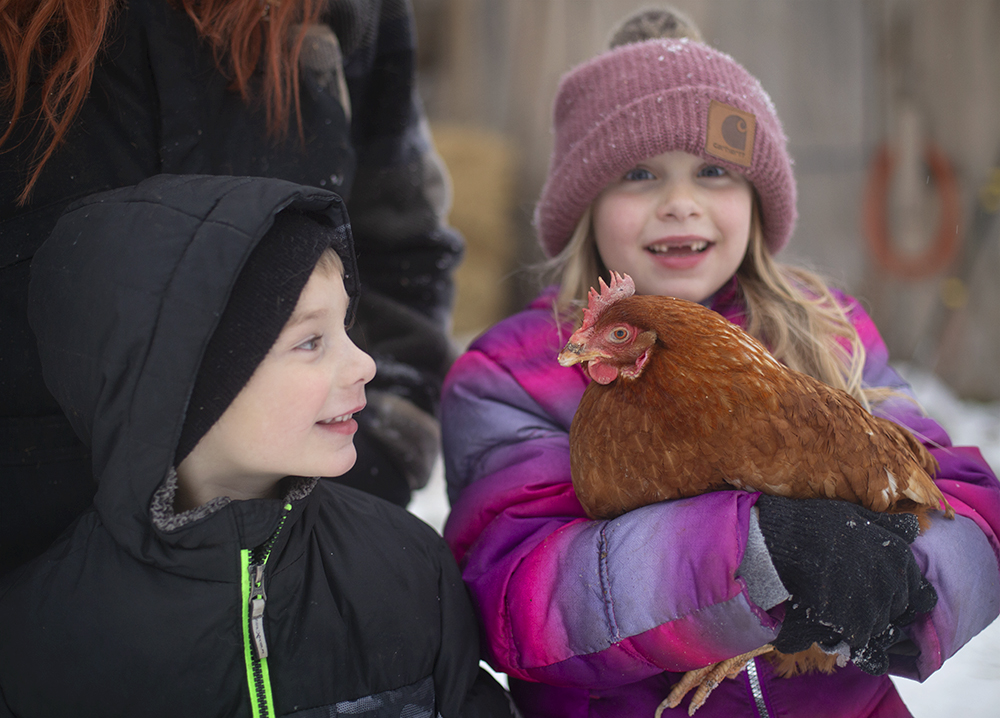
Current: How have you seen Benzie County/Northern Michigan change since you grew up here? What are your hopes for the area in the future? What are the biggest challenges and rewards of living/working here? What is the best or most rewarding part of your job?
Emmily: I would like to see land use changes in Benzie County—the area that surrounds Benzie has significantly more agricultural activity, and part of the reason for that is zoning. One of the most rewarding parts of living/working in Northern Michigan is being surrounded by natural beauty. Two of the biggest challenges of living/working here can be the small local economy and the weather.
Jason: I’ve seen a lot of barns fall down and a lot of million-dollar homes built for seasonal use—I’d like to see that curve flatten out some in the future. In general, challenges almost always end up being rewarding. For me, the most rewarding part of my job is seeing my children smile while consuming food that they helped to produce and considering the advantage that the food and knowledge connected to it represents.
Current: What could Northern Michigan do to attract more talented young people to this area?
Jason: Northern Michigan should put more effort into producing talent and less into importing it. Vocational training needs to be available locally for young adults, who are soon to be entering the workforce.
Current: What else does Northern Michigan/Benzie County need?
Emmily: If you’re asking the farmer, we need more hay fields and more butchers.
Jason: Yes, hay fields and butcher shops.
Current: What kinds of things do you do for fun, when you are not working? What other things are you involved with? How did you get involved with them, and why are you passionate about these causes?
Emmily: Like proper Frankfortians, we enjoy going to the beach in the summer. I also have some agricultural-related hobbies—cheese-making, seed-saving, and making charcuterie—that keep me happy in the winter.
Jason: All of my hobbies are directly related to agriculture. I really enjoy spending time helping neighbors and talking with people who are more than twice my age. “Spare time” is not something that we have, but if I find an opportunity for recreation, I try to spend it gleaning wisdom or providing a smile. I am passionate about the ecological and economic impacts that my actions have on the world around me.
Current: What are your favorite local events and activities? Any favorite dining, recreation, hiking spots?
Emmily: We love the local food trucks—Upriver Wood-Fired Pizza in Honor is our summertime fave! East Shore Market has been on our lifelong lunch menu. We are excited for a new Italian restaurant that is opening soon in Frankfort, Vita Bella. We enjoy foraging, especially for mushrooms; we usually find oyster mushrooms, chicken of the woods, cinnamon caps, and morels. We also love foraging for leeks, black raspberries, and wild blueberries.
Current: What does your perfect winter day look like in Benzie County? How would you spend it?
Jason: When the sun hits our southern-facing slope on a calm winter morning, there’s really no better place to be. Feeding and caring for a beautiful, bountiful, diverse herd of round, shaggy swine is the perfect winter day for me.
Visit “1801 Farm” on Facebook or @1801farm on Instagram to learn more and see inventory. Call Jason 231-930-7990 or email 1801farm.emmily@gmail.com for more information about pasture-based proteins, delivery options, bulk and/or custom orders. Contact Jason Sheffield, Sheffield Carbon Farms LLC, for land, resource, and livestock-management needs.
Featured Photo Caption: Jason and Emmily Sheffield with their children, Jason and Fae, along with a chicken. The Sheffields own 1801 Farm of Frankfort, where they tend chickens, heritage pigs, and a few cattle. Photo by Aubrey Ann Parker.

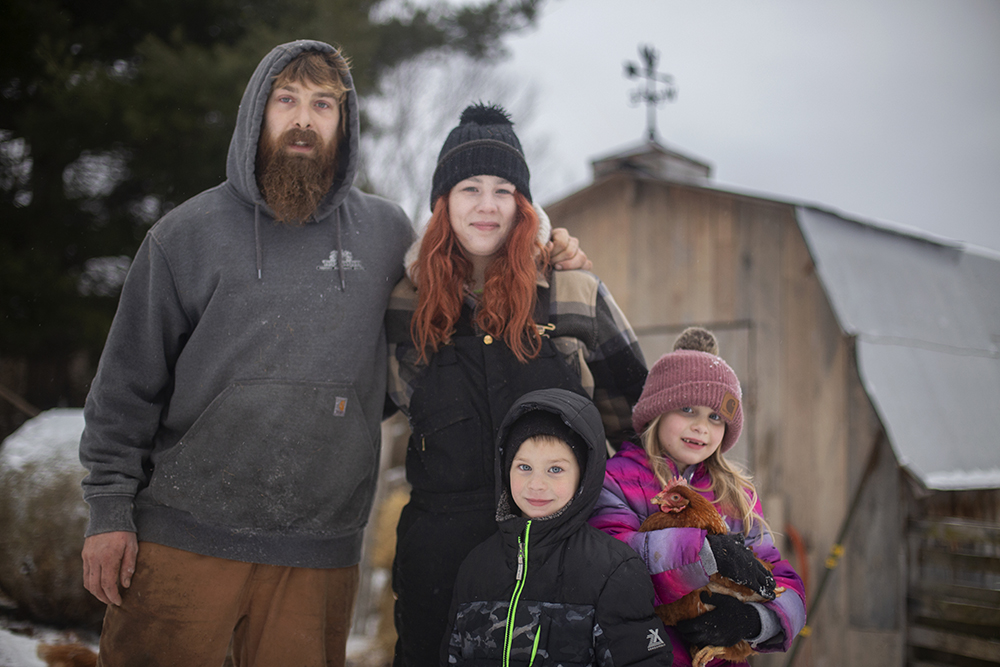
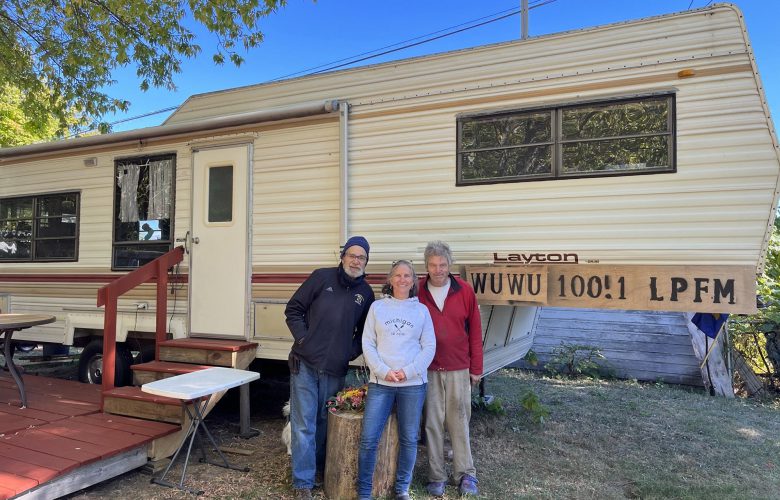

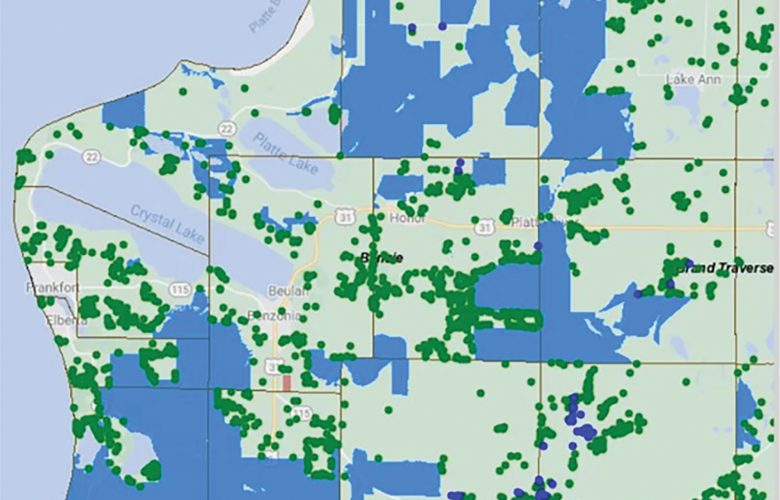
We live on Upper Herring lake in Frankfort. 2 domestic geese that are apparently lost, befriended us. One disappeared (can’t imagine what happened ). We are praying we find a home for the lonely one left. Would you be, or know anyone who would be willing to become a foster parent to this very goose? Please contact me either way. 269-605-3484. Thank you!!